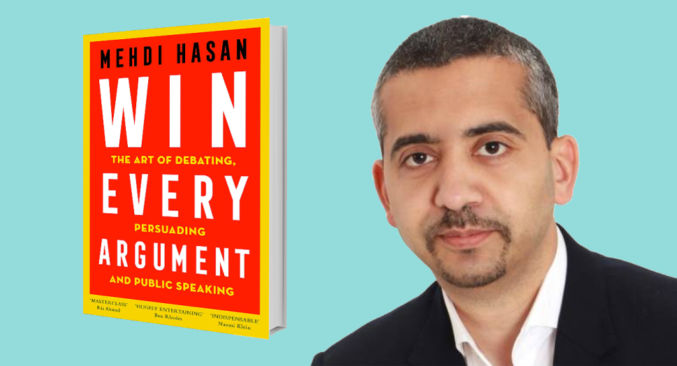This post is a summary of a summary of the New York Times best-selling book Win Every Argument: The Art of Debating, Persuading, and Public Speaking by Mehdi Hasan.

Persuasive arguments appeal to facts and feelings
The ancient Greeks called the language deployed in such debates rhetoric – a word derived from rhetor, meaning “public speaker.” For Aristotle, persuasive speech has three modes: ethos, pathos, and logos.
Ethos (Character / Credibility)
Ethos is the Greek word for “character”. In this context, it concerns the credibility of the person. For example, we’re more inclined to accept what a practicing doctor has to say about vaccinations, for example, than an anonymous blog author.
Pathos (Emotion)
Pathos is the Greek word for “emotion”. In this context, it concerns an attempt to sway an audience by appealing to powerful emotions such as love and fear. For example, if a doctor’s credentials haven’t persuaded their reluctant patient, they doctor may tell a story about a couple in perfect health who refused to get vaccinated but died within 15 days of each other leaving behind four young children. The patient would feel emotionally in fear and be more inclined to trust the doctor.
Logos (Facts, Figures, Data, Statistics)
Logos is the Greek word for “reasoning”. This form of persuasion deals in facts and figures. For example, if a doctor points out that multiple peer-reviewed studies show that COVID vaccines result in a 90% decrease in the risk of hospitalization and death, they’re appealing to logos.
Arguing using just logos (facts and figures) is insufficient because people are stubborn, reactive, overconfident, afraid of change, and, more importantly, emotionally invested in beliefs, ideas, and ideals. People’s feelings don’t care about the facts. Therefore, to win an argument, you need also appeal to feelings, not just state the facts.
Tell Stories to Appeal to Feelings (Pathos)
According to 2007 study, people are much more likely to give money to charity if they’re told stories about an “identifiable victim” than they are if they’re presented with accounts of “statistical victims.” For example, a story of the suffering of a single child with a name and a face is more effective than a description of millions of nameless and faceless people suffering in the same way. For example, telling a story about the awful hunger cramps that one child suffers every day is more effective than abstract statements like “820 million people around the world go hungry every day”.
To win arguments, tell gripping and relatable stories.
Cite Credibility, as Necessary (Ethos)
When debating, your aim is to go after the argument, not the person making it. If you go after the person, that’s ad hominem. In theory, the merits of the person speaking have nothing to do with the soundness of what they’re saying, but in reality, merits matter. When facts and figures (logos) are insufficiently convincing, then cite the person’s character and reputation (ethos).
Conflicts of Interest
Imagine a major study is published that claims to show that climate change isn’t nearly as bad as we thought. The caveat: it was entirely funded by fossil fuel companies. If the authors of the study were paid by companies with a less than purely academic interest in the topic, then there’s a conflict of interest. Therefore, dismissing the study on the credibility of the authors is a logical and reasonable thing to do.
Hypocrisy
If an outspoken anti-abortion lawmaker privately supports women having abortions, then they are hypocrites. In theory, the hypocrisy of the person speaking has nothing to do with the soundness of what they’re saying, but in reality, hypocrisy matters.
To win arguments, consider citing the credibility of the speaker.
Conclusion
- State facts and figures.
- Tell gripping and relatable stories.
- Consider citing the credibility of the speaker.



